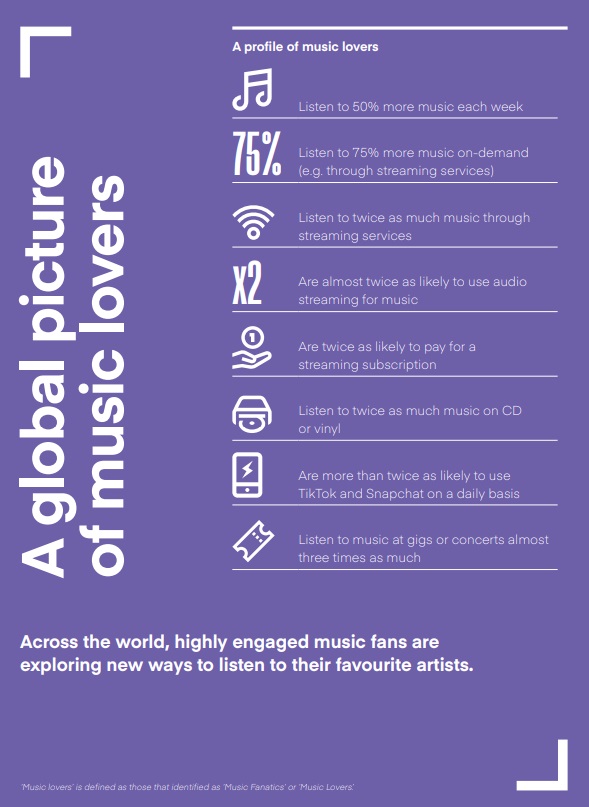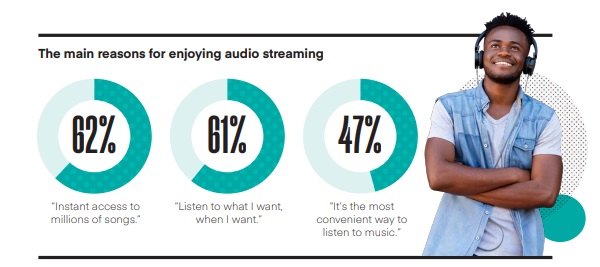IFPI’s full Music Listening Report 2019 is here
IFPI’s definitive report gives us one of the best snapshots each year of how the music industry is looking and transforming each year.
The IFPI represents the worldwide music industry in its studies. Each year they examine how people are listening to music across 21 countries and aged between 16-64 for a definitive snapshot of what listening is like in a year.
You can view the full in-depth report here. We’ve got a summary of the biggest news about music consumption below so you have a snapshot of listening in 2019.
Music Listening is on the rise
Where surveyed, IFPI found that people are now listening to music for 18 hours a week on average. That’s about 2.6 hours a day – roughly 52 average length songs!
This is increased from 2018 when respondents were listening for 17.8 hours on average.
Older generations are getting on the music streaming hype
The study showed that 64% of those surveyed have listened to a music streaming service in the past month. A massive overall statistic that is up 7% from 2018.
The older age groups have generally been lower in music streaming usage and slower to pick it up but that’s changing.
The 35-64 year-old age group showed the highest rate of growth for streaming engagement this year. 54% within that age group reported listening to music on streaming services in the past month. An 8% increase on last year.
The majority of listeners identify as music lovers or fanatics
More than half of people asked say that they love music or are music fanatics. Whilst 54% of overall listeners said they’re music lovers that percentage raised to 63% for 16-24 year olds.
The report shows that South Africa has the biggest music lovers of the countries involved. 75% of South Africa accordingly describe themselves as music lovers or fanatics!

IFPI’s Chief Executive Frances Moore spoke on the year in music in the report. She wrote: “This report paints a vibrant picture of a world enjoying the widespread availability of rich and varied music. Record companies work every day to make this happen.
“Music has always held an important place in people’s lives, of course, but this year’s report tells a story of fans’ ever-growing global engagement with music. In fact, most people identify as “loving” or being “fanatical about music. At a time when multiple forms of media vie for fans’ attention, they are not only choosing to spend more of their time listening to – and engaging with – music but they are doing so in increasingly diverse ways.”
About IFPI
IFPI is the organisation that promotes the interests of the international recording industry worldwide. Its membership comprises some 1,300 major and independent companies in almost 60 countries. It also has affiliated industry groups in 56 countries. IFPI’s mission is to promote the value of recorded music, campaign for the rights of record producers and expand the commercial uses of recorded music in all markets where its members operate.
Methodology
IFPI conducted global research in April-May 2019 which explored the way consumers engage with and access music across licensed and unlicensed services.
Fieldwork questioned a demographically representative sample of the online population aged 16-64 in the following territories: Argentina, Australia, Brazil, Canada, France, Germany, Italy, Japan, Mexico, Netherlands, New Zealand, Poland, Russia, South Africa, South Korea, Spain, Sweden, United Kingdom and United States. The study was also conducted in China and India but results from these two countries are not included in “global” figures. These twenty-one territories accounted for 92.6% of global recorded music market revenues in 2018, according to IFPI’s Global Music Report 2019.
In total, 34,000 internet users were surveyed with higher numbers of respondents in larger markets. Nationally representative quota samples of between 1,000-3,000 respondents were set in accordance with online population size and demographic structure, as determined by the latest respective census data in each territory. This ensured that a standard error of +/- 3% was achieved throughout the data, at a 95% confidence level. Study design, construction, and analysis was conducted by IFPI with fieldwork organised by AudienceNet.
